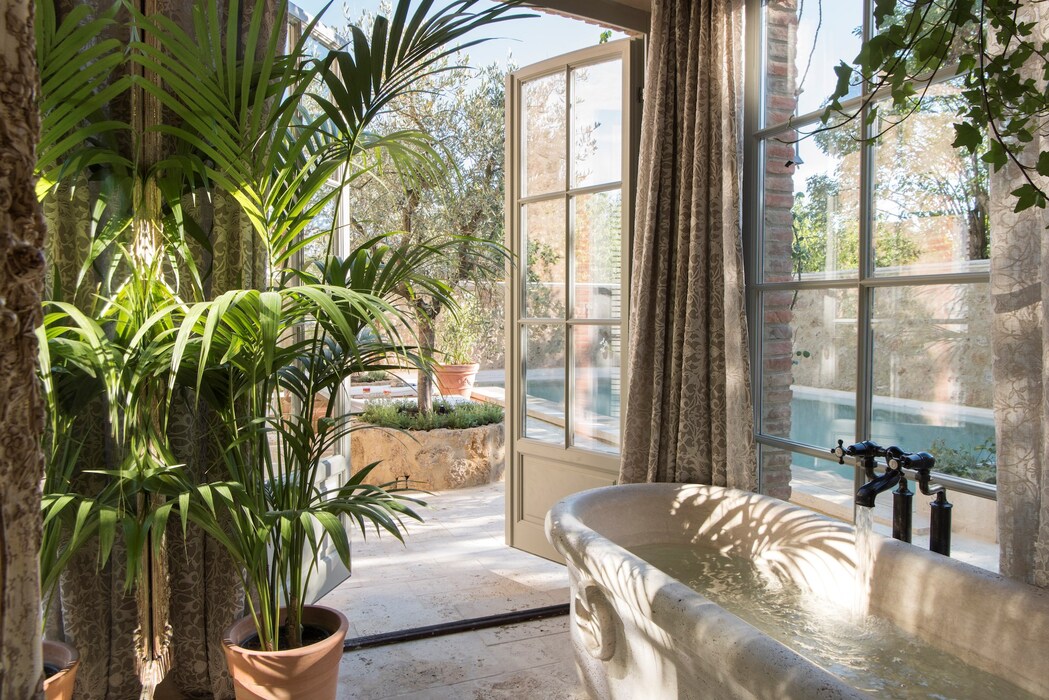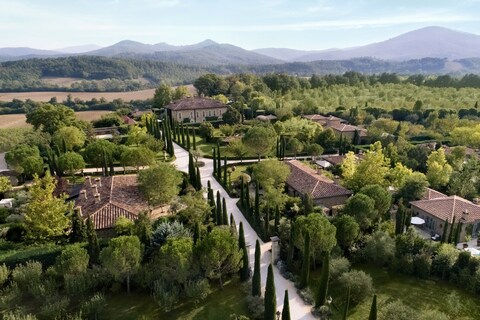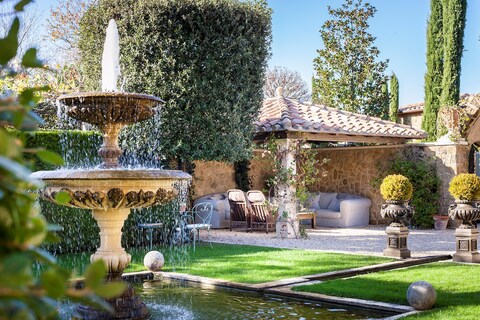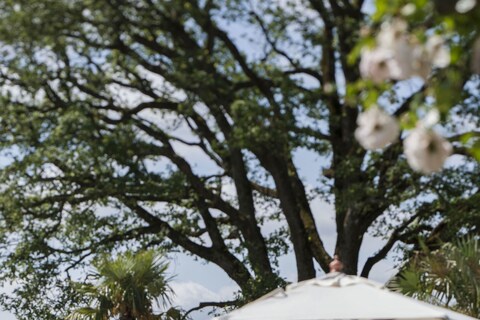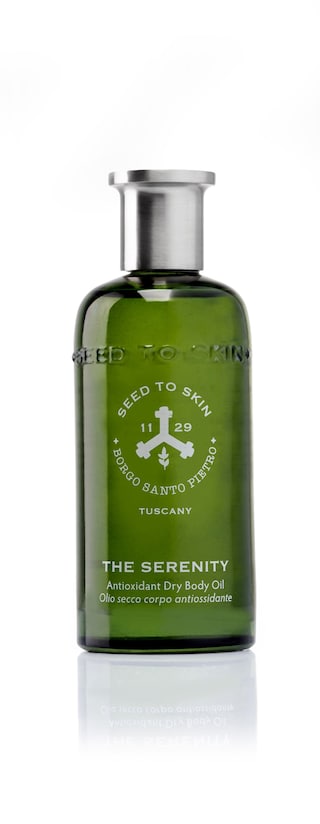From the niche new beauty brands doing something different, to the industry’s evergreen icons, Sophie Bew opens up AnOther’s dream vanity. A new addition to our skincare to-do list – a five-star organic beauty destination in Italy
Among 300 acres of sprawling fields, olive groves and forests in Tuscany’s Valle Serena sits Borgo Santo Pietro, a 12th-century estate home not only to a working farm and an exquisite boutique hotel (think stuccoed dining rooms, looming fireplaces, private garden suites with pools and spa-like bathrooms and not one, but two Michelin-starred dining options) but the birthplace and laboratory of beloved science-led natural skincare brand, Seed to Skin. The brand’s creative director Jeanette Thottrup bought the property as a ruin with her husband Claus in the balmy summer of 2001, while on their way back to the airport from a holiday.
In glossy moss-green glass jars with hefty chrome lids, Seed to Skin’s sumptuous formulations have decked Liberty London’s shelves for more than four years now, having later joined Net-a-Porter’s heaving beauty roster in 2019. There are a number of bestselling cult products with fans all over the world: the jelly-like calendula-scented Golden Dew mask, complete with newly discovered hyaluronic acid-like marine ferment, Pseudoalteromonas Exopolysaccharide; the marzipany Black Magic mask with detoxifying activated charcoal; the almost-spiritual rose geranium and sandalwood scented Midnight Miracle Cell Recovery oil; and the refreshing cider vinegar spritz of the exfoliating and microbiome-boosting Fermen’tonic.
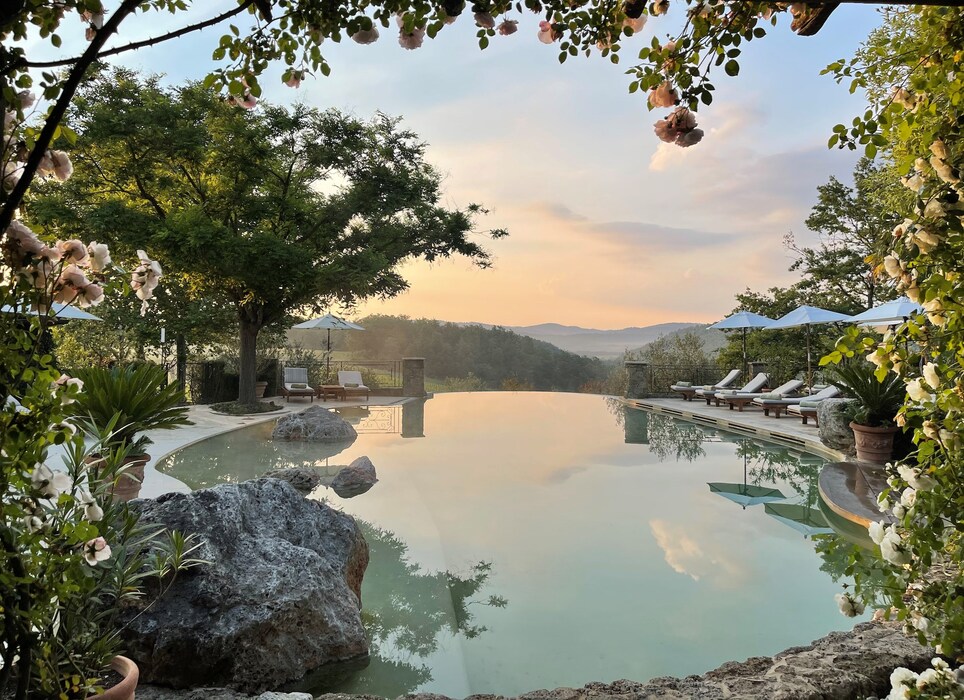
But these high-end hit products have humble origins: Jeanette started studying natural medicine with Neal‘s Yard after years of being unable to conceive with her husband (they now have a teenage son, Vincent). She mixed her first product, a rich sheep milk body balm, with pharmacist and cosmetologist Anna Buonocore in their first lab – an open-plan Tuscan kitchen in a little outbuilding on the Borgo grounds that is now the chef’s fermentation kitchen. An updated iteration, The Devotion Restorative Body Balm, contains Seed to Skin’s own O-Thermil Complex formula, a ‘skin superfood’ of sheep’s milk, olive leaf, probiotics and mineral-rich thermal water that can be found beside each hotel suite bathtub. Today that famed shed teems with vast wooden shelves of cloth-capped jars of pickling carrots, beetroots, olives and herbs; huge vats of cloudy kombucha house their furry tongue mothers. The building is now flanked by the hotel’s yoga barn and the farm’s vast nasturtium-filled greenhouses and sits atop a winding path, down which you’ll find the chicken and sheep farms, beehives (all of which supply both the kitchen and the lab) and numerous freshwater wild swimming spots.
It was on this picturesque hilltop spot that Throttrup and Buonocore designed Seed to Skin’s first skincare product, too, The Divine Cleanse. Another bestseller, it’s a luscious honey-like oil-to-milk-turning gel that uses green marine clay to detoxify the skin and reduce inflammation, Vitamin E-rich sweet almond oil and pore-reducing, tightening white grapefruit extract. It really is divine. They spent five years tinkering with formulations here “in our little sandpit,” Throttrup says, until they launched in 2018. Nowadays the duo’s lab is a golf buggy ride away in the local village – which is populated almost entirely by the hotel’s staff. It’s a dramatic upsizing from the original, in order to cope with the demands of their increasing global customer base.
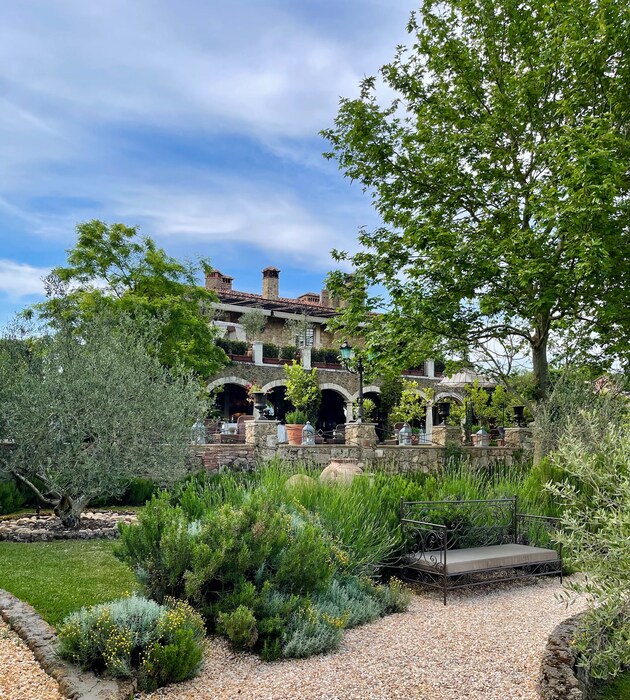
While some ingredients come from the estate farm (sheep milk, honey, organic herbs), many don’t – “I don’t believe in organic,” says Thottrupp over a glass of their rosé (for me) and coffee (for her), looking over one of the property’s long sloping vineyards. “Well I do, but I don’t,” she laughs. “We’re an organic farm, yes, but we’ve tested organic [beauty] products that are full of toxins. Certifying bodies also have an agenda – it’s not like you get a stamp and then everything is perfect. So we use organic whenever we can but we test everything we do. In the past, we’ve had to scrap ingredients we thought were the highest quality but were full of toxins. For instance, you can have an organic certification and grow something next to the motorway and if you grow anything with vitamin C or antioxidants in, they’ll attract the pollution. You’ve got to make sure anything with vitamin C is grown in really clean air. That’s the sort of thing we’re testing for.” And while Thottrupp prefers the backing of intensive scientific testing in her lab in France, you can still feel the earthy origins of her ingredients: many of the products’ shelf lives are short, they smell alive (and then dead, when they’re done). It makes the products practical, too – they beg to be used. Nature is synthesised but not beyond recognition.
The Borgo Santo Pietro hotel straddles both luxury and naturalism in a similar way. While organic cheeses, vegetables, ferments and wine can be brought (literally) from farm to table and served in the surrounding fields, one can also take a bespoke facial in the spa adjacent to the manicured walled gardens dotted with four-poster cabana beds and tall bearded irises. Breakfast can be enjoyed in the palatial splendour of the frescoed Saporium terrace, surrounded by exquisite still lifes of pom-pom hydrangeas – all grown on-site and arranged by the in-house florist – and followed by a dip in the (freshwater) infinity pool. Aperitivo can be taken in the formal gardens, or overlooking the rolling hills of the farm itself – that delicate balance will leave you feeling as good inside as you look outside.
Stays at Borgo Santo Pietro can be booked here and Seed to Skin can be found on Liberty and Net-a-Porter.
